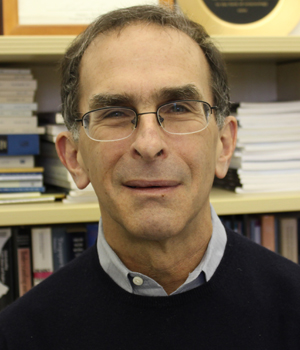January 30, 2014
 PITTSBURGH—The American Academy of Political and Social Science (AAPSS) has named Carnegie Mellon University's Daniel S. Nagin a 2014 fellow for his efforts to improve society through research and influence over public policy.
PITTSBURGH—The American Academy of Political and Social Science (AAPSS) has named Carnegie Mellon University's Daniel S. Nagin a 2014 fellow for his efforts to improve society through research and influence over public policy.
As one of seven fellows elected this year, Nagin will be honored at an AAPSS ceremony on May 8 in Washington, D.C.
"We're very pleased that each of these extraordinarily accomplished individuals will join the academy this year," said Douglas Massey, president of the AAPSS and a Princeton University sociologist. "Each has made essential contributions to our understanding of how American society functions and whether our public policies act in the common good. They are distinguished public servants and scholars, and we are privileged to have them among us."
Nagin, who is the Teresa and H. John Heinz III University Professor of Public Policy and Statistics, associate dean of faculty at CMU's H. John Heinz III College and an alumnus of the university, was cited for his work in using statistical methods to analyze criminal and antisocial behavior over the course of individuals' lives.
He developed a statistical methodology called group-based trajectory modeling that has revolutionized the study of data that track individual development over time. Application of the method to these data has made clear that the developmental origins of criminal and violent behavior can be traced to very early in life. This finding underscores the importance of early interventions into the lives of children at high risk of following developmental trajectories that contribute to violence in adolescence and beyond.
The AAPSS, founded in 1889, promotes the use of social science in the public domain and in policy-making. It has honored 93 individuals as part of its fellows program, which began in 2000.
Nagin was awarded the Stockholm Prize in Criminology in October for his research showing that imprisoning offenders generally fails to reduce repeat offenses and may even exacerbate relative to community corrections options. His work helped to support the first decline in four decades in the U.S. incarceration rate.
###
Nagin (pictured above), the Teresa and H. John Heinz III University Professor of Public Policy and Statistics, was cited for his work in using statistical methods to analyze criminal and antisocial behavior over the course of individuals' lives.
News Brief: Carnegie Mellon's Daniel S. Nagin Named a 2014 Fellow of the American Academy of Political and Social Science
Contact: Abby Simmons / abbysimmons@cmu.edu / 412-268-4290 PITTSBURGH—The American Academy of Political and Social Science (AAPSS) has named Carnegie Mellon University's Daniel S. Nagin a 2014 fellow for his efforts to improve society through research and influence over public policy.
PITTSBURGH—The American Academy of Political and Social Science (AAPSS) has named Carnegie Mellon University's Daniel S. Nagin a 2014 fellow for his efforts to improve society through research and influence over public policy. As one of seven fellows elected this year, Nagin will be honored at an AAPSS ceremony on May 8 in Washington, D.C.
"We're very pleased that each of these extraordinarily accomplished individuals will join the academy this year," said Douglas Massey, president of the AAPSS and a Princeton University sociologist. "Each has made essential contributions to our understanding of how American society functions and whether our public policies act in the common good. They are distinguished public servants and scholars, and we are privileged to have them among us."
Nagin, who is the Teresa and H. John Heinz III University Professor of Public Policy and Statistics, associate dean of faculty at CMU's H. John Heinz III College and an alumnus of the university, was cited for his work in using statistical methods to analyze criminal and antisocial behavior over the course of individuals' lives.
He developed a statistical methodology called group-based trajectory modeling that has revolutionized the study of data that track individual development over time. Application of the method to these data has made clear that the developmental origins of criminal and violent behavior can be traced to very early in life. This finding underscores the importance of early interventions into the lives of children at high risk of following developmental trajectories that contribute to violence in adolescence and beyond.
The AAPSS, founded in 1889, promotes the use of social science in the public domain and in policy-making. It has honored 93 individuals as part of its fellows program, which began in 2000.
Nagin was awarded the Stockholm Prize in Criminology in October for his research showing that imprisoning offenders generally fails to reduce repeat offenses and may even exacerbate relative to community corrections options. His work helped to support the first decline in four decades in the U.S. incarceration rate.
###
Nagin (pictured above), the Teresa and H. John Heinz III University Professor of Public Policy and Statistics, was cited for his work in using statistical methods to analyze criminal and antisocial behavior over the course of individuals' lives.